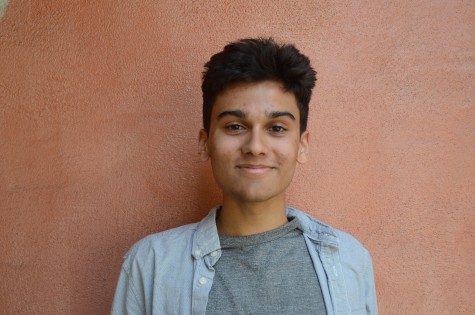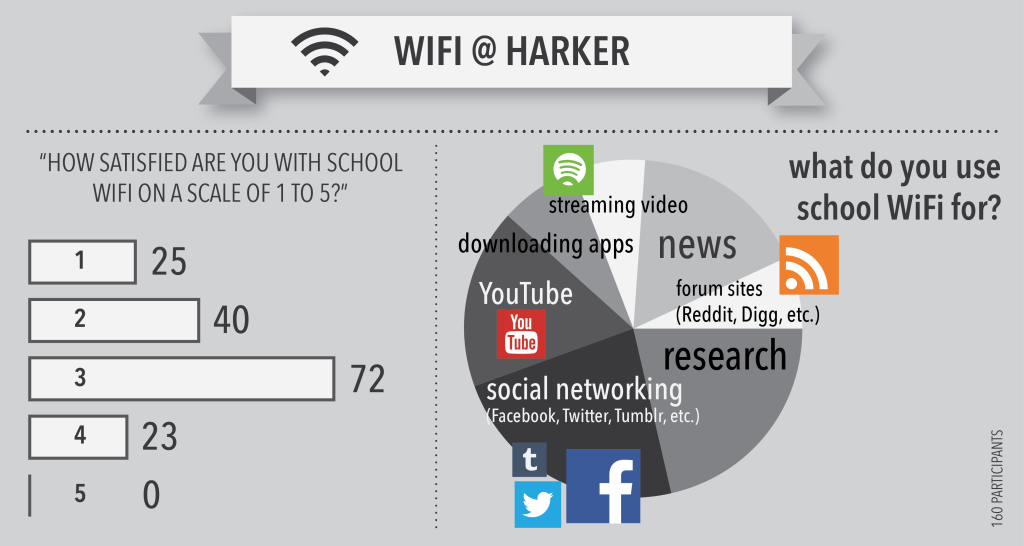Upper School investigates wireless Internet troubles, makes adjustments
The speed of wireless Internet access in places like Main Hall remains a common complaint at the Upper School, but with recent changes, these issues may no longer exist for students and teachers this semester.
“What we’ve got in Main building is a lot of cinderblocks,” said Daniel Hudkins, Instructional Technology faculty member, referencing the cement that makes up most of the walls for Main building. “And cinderblocks are particularly not helpful at transmitting radiowaves.”
During the second half of Winter Break, Upper School computer technician Alex Osorio ran diagnostics on many of the transmitters located on the walls of each classroom in Main Hall. He reoriented and swapped out antennae, and in some room’s cases, he added a panel to further boost Internet speeds.
Tech staff have also opened a second WiFi network, entitled “MercuryFast” for students and teachers. This connection has the same password as the regular WiFi network, but serves to curb the flow of users all on a single network at once by introducing an alternate way of accessing the Internet.
Hudkins cited a number of other upcoming changes to the Upper School, including an increase of bandwidth from 100 megabits per second (mbps) to 300 mbps. The tentative date assigned for this change is Feb. 1, but there will be more certain details as the date comes closer.
“That will probably speed up the WiFi a lot more,” Thomas Lee (10) said. “Now, the Internet doesn’t have to be super slow, because in English the Internet crashes every other day.”
Students can also avoid putting added stress on the bandwidth by changing the way they use the Internet while on campus. Applications set to automatically synchronize photo libraries or music libraries through WiFi take up a huge amount of bandwidth.
Streaming videos or music on websites such as YouTube, Hulu, or Netflix also causes problems.
“I know that there are teachers here that use YouTube fairly frequently, but there’s a fair amount [of YouTube videos] that I think fall into the ‘cute kitten’ or ‘foolish prank’ category that is being viewed in one of those quiet moments of downtime that we enjoy so much,” Hudkins said. “[It] really would be nice if there was not so much non academic YouTube, because that sucks up a lot of bandwidth.”
Upgrading software through the school WiFi connection additionally affects schoolwide connectivity in a negative way because of the amount of wasted bandwidth.
“It comes to a point where I think we’ve all gotten used to having unlimited access and unlimited ability to do everything we need to, but that’s never really the case,” said Diane Main, Assistant Director of Instructional Technology. “We can only have so many users transmitting so many bits at one time. We are accustomed to having what seems unlimited, but we’ve basically pushed it to its limits.”
According to Main, parents of students at the Upper School often approach her with concerns regarding whether or not leisure sites should be blocked altogether, both to allay problems with connectivity and to keep students on track during classes.
“Our philosophy is, when a student is in high school, he or she is planning to go off to the world, and they’re old enough to begin to regulate themselves in terms of what choices they make,” Main said. “[When you block sites], it’s almost like forbidden fruit, and people are going to find a way to get to it anyway, which is not behavior we necessarily want to encourage. It’s just about giving people the opportunity to make good choices.”
Some students have not noticed much improved in terms of connectivity, but most concur with Main’s assessment on allowing students the freedom of choice.
“Sometimes the connection is strong and sometimes it’s weak,” Nikhil Ramgiri (10) said. “We’re high school students, and so we should be able to determine when to visit academic sites and when to visit recreational sites.”
More changes will soon occur that will expedite the Internet connectivity at the Upper School. As these dates move closer, more information will be available on Harker Aquila.
This piece was originally published in the pages of the Winged Post on Jan. 27, 2014.
Elisabeth Siegel (12) is the editor-in-chief of the Winged Post. This is her fourth year in Journalism, and she especially loves production nights and...

Shay Lari-Hosain (12) is the Editor-in-Chief and co-founder of Wingspan Magazine. Shay has interviewed 2013 Nobel Laureates, authors like Khaled Hosseini...


















![“[Building nerf blasters] became this outlet of creativity for me that hasn't been matched by anything else. The process [of] making a build complete to your desire is such a painstakingly difficult process, but I've had to learn from [the skills needed from] soldering to proper painting. There's so many different options for everything, if you think about it, it exists. The best part is [that] if it doesn't exist, you can build it yourself," Ishaan Parate said.](https://harkeraquila.com/wp-content/uploads/2022/08/DSC_8149-900x604.jpg)




![“When I came into high school, I was ready to be a follower. But DECA was a game changer for me. It helped me overcome my fear of public speaking, and it's played such a major role in who I've become today. To be able to successfully lead a chapter of 150 students, an officer team and be one of the upperclassmen I once really admired is something I'm [really] proud of,” Anvitha Tummala ('21) said.](https://harkeraquila.com/wp-content/uploads/2021/07/Screen-Shot-2021-07-25-at-9.50.05-AM-900x594.png)







![“I think getting up in the morning and having a sense of purpose [is exciting]. I think without a certain amount of drive, life is kind of obsolete and mundane, and I think having that every single day is what makes each day unique and kind of makes life exciting,” Neymika Jain (12) said.](https://harkeraquila.com/wp-content/uploads/2017/06/Screen-Shot-2017-06-03-at-4.54.16-PM.png)








![“My slogan is ‘slow feet, don’t eat, and I’m hungry.’ You need to run fast to get where you are–you aren't going to get those championships if you aren't fast,” Angel Cervantes (12) said. “I want to do well in school on my tests and in track and win championships for my team. I live by that, [and] I can do that anywhere: in the classroom or on the field.”](https://harkeraquila.com/wp-content/uploads/2018/06/DSC5146-900x601.jpg)
![“[Volleyball has] taught me how to fall correctly, and another thing it taught is that you don’t have to be the best at something to be good at it. If you just hit the ball in a smart way, then it still scores points and you’re good at it. You could be a background player and still make a much bigger impact on the team than you would think,” Anya Gert (’20) said.](https://harkeraquila.com/wp-content/uploads/2020/06/AnnaGert_JinTuan_HoHPhotoEdited-600x900.jpeg)

![“I'm not nearly there yet, but [my confidence has] definitely been getting better since I was pretty shy and timid coming into Harker my freshman year. I know that there's a lot of people that are really confident in what they do, and I really admire them. Everyone's so driven and that has really pushed me to kind of try to find my own place in high school and be more confident,” Alyssa Huang (’20) said.](https://harkeraquila.com/wp-content/uploads/2020/06/AlyssaHuang_EmilyChen_HoHPhoto-900x749.jpeg)



